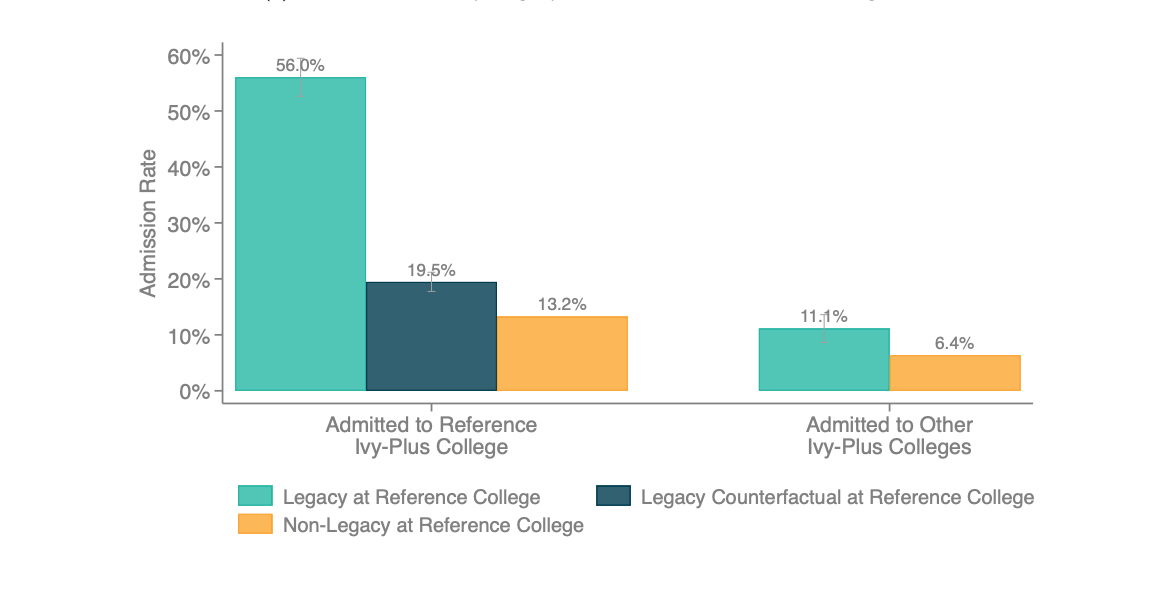For decades, legacy advantage has been a prominent factor in the college admission process. However, following the June Supreme Court ruling to eliminate affirmative action, Students for Fair Admissions v. Harvard, many high school seniors and their families debate the role legacy advantages will play in upcoming college admission seasons.
On June 29, 2023, the Supreme Court ruled to eliminate race-based college admissions, claiming that the practice violated clauses in the Fourteenth Amendment which establish equal opportunities for all citizens regardless of race. This decision was soon followed by an outburst of backlash, with many Americans questioning the constitutionality of other preference admissions, such as legacy advantages – college admissions preferences granted to children of alumni.
Among the outspoken included President Joseph Biden, who announced on the day of the ruling that the Department of Education would examine other preference-based admissions. “Practices like legacy admissions and other systems expand privilege instead of opportunity,” he said.
Biden was not the only politician to refute the ruling and target legacy admissions as the next to be dissolved. A month later, on July 29, 2023, a group of congressional democrats reintroduced The Fair College Admissions for Students Act–a bill opposing legacy preferences that was originally published and subsided in spring 2022. The bill aims to amend the Higher Education Act of 1965, which prohibits institutions that consider legacy or donor status from participating in federal student aid programs, encouraging the abolition of legacy preferences in the admissions process. The bill is yet to be processed, but the support to eradicate legacy preferences is growing, and multiple elite colleges have begun to respond by eliminating the practice themselves.
Within the past decade, Johns Hopkins University, Pomona College, Wesleyan University and Amherst College are some of the institutions who have announced their removal of legacy preferences in the admissions process. Instead, these colleges solely rely on information submitted to the college by the applicant, and as a result have decreased the amount of legacy admittees. For example, Amherst College publicly renounced their consideration of legacy advantage in October of 2021. According to The Hill, a political newspaper based in Washington D.C., Amherst later saw a percent decrease of legacy admittees from eleven to nine percent, as well as a record-high percentage of first-generation admittees at 19 percent.
Many high-school students, such as Amieh Joi Brooks ’24, hope more colleges will follow their lead, expressing that legacy advantages reinforce the power of privilege in modern day society. “People who have a legacy advantage are often those who already have and are granted more opportunities based on their privilege in society. Legacy advantages just further enforce these privileges,” she said.
Legacy advantages were first introduced in Ivy League schools during the 1920s. According to National Geographic, the eight elite schools originally aimed to limit the amount of Eastern European, primarily Jewish, immigrant students. Legacy advantages allowed colleges to re-admit protestant, Anglo-Saxon students and take up the spaces for Jewish applicants. In addition, legacy preferences were seen to strengthen the alumni community and increase the amount of donations, which remains a prominent reason for considering legacy admissions to this day. Colleges still hope to foster a closely knit, supportive alumni community and believe that legacy admissions is the key to opening those doors.
At the time, legacy advantage nearly guaranteed enrollment to the top collegiate universities nationwide as students with legacy were held to a lower standard of standardized test score and often had more resources to build their applications than European immigrants.
Though legacy advantages have evolved throughout the century, similar disparities are still apparent in the college process today.
This past July, Opportunity Insights, a research group based at Harvard University aiming to identify economic adversities prevalent in the United States, published results to their study into college admissions factors such as legacy and wealth at 33 elite college institutions: 12 Ivy-Plus institutions (Ivy league, Stanford, MIT, Duke and Chicago), 12 other highly competitive private colleges (eg. Washington University in St. Louis, Northwestern University) and nine highly selective public institutions (eg. University of California at Berkeley).
Average Admission Rate by Legacy Status at Case Studied Colleges (Reference Colleges)

The results revealed that even without the consideration of legacy, children of alumni were 33% more likely to be admitted to elite private colleges in the U.S. Researchers speculated that this may be a result of the environment that alumni students grew up in and the resources that were available to them.
An economist at Harvard University and the director of Operation Insights, Raj Chetty, was one of the researchers who supported this claim. “Are these highly selective private colleges in America taking kids from very high-income, influential families and basically channeling them to remain at the top in the next generation?” he said in an interview with The New York Times.
Additionally, when alumni preferences were included in the application process, legacy students had over four times the admittance rate than non-legacy applicants.
The Opportunity Insights study was one of many that explored the realm of legacy preferences and revealed discrepancies among legacy and non-legacy students. Though legacy has been a subject of debate for many decades, it is receiving rigorous scrutiny after the elimination of Affirmative Action.
In addition, since the COVID-19 pandemic, many colleges have begun to rethink many aspects of their applications such as mandated standardized testing. As college applications continue to change, and the application process becomes more competitive as the applicant pool grows, many are left wondering whether legacy will be the next factor to fall.
Today, over 700 colleges and universities nationwide continue to consider legacy as a factor in the application process, but even so, collegiate institutions continue to shift their policies. It is possible that the case of considering legacy preferences in college admissions could be taken to court and overturned at any time, but until then, the debate over legacy remains open for discussion.






Si vous recherchez de l’excitation et des opportunités uniques dans le monde des paris en ligne, vous ne pouvez pas manquer de profiter du code promotionnel 1xbet. 1xbet code promo pari gratuit Avec le code promotionnel 1xbet, vous accéderez à des offres et bonus exclusifs qui élèveront votre expérience de jeu à un autre niveau. Que vous préfériez les paris sportifs ou les jeux de casino, le code promotionnel 1xbet vous fera bénéficier d’avantages supplémentaires pour maximiser vos chances de gagner. Ne manquez pas cette opportunité extraordinaire de profiter pleinement de vos paris en ligne avec le code promotionnel 1xbet. Inscrivez-vous aujourd’hui et découvrez pourquoi nous sommes leader dans le monde des paris en ligne grâce à notre code promotionnel exclusif !